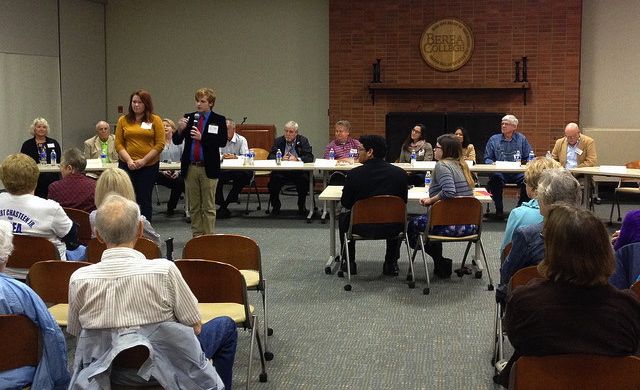
By Rebecca Eskalis, NCSU Class of 2018 and CFSA’s Adolph Warren Family Leadership Program Intern
Disclaimer: This article is for informational and educational purposes only; it is not legal advice. If you have questions about how the IRS will treat a particular activity conducted by your non-profit organization, consult an attorney.
If you are a leader, manager, or member of a 501(c)(3) non-profit organization that works on food or farm policy, listen up! I’m going to guide you through the ways non-profit organizations like yours can advocate for farms and food in an election year without running afoul of the IRS’ rules limiting advocacy work by organizations like yours.
501(c)(3) organizations are eligible for certain tax exemptions, tax-deductible contributions, and grants from private foundations. In exchange for these boons, federal law imposes restrictions on the activities of non-profit organizations. Today, we’re going to take a look at the restrictions the IRS puts on election-related advocacy, since we’re in a big election year.
This piece addresses five ways non-profits might want to get involved in an election and how much or how little of this work runs afoul of the IRS’ rules.
-
Issue advocacy;
-
Candidate education;
-
Voter education and outreach;
-
Ballot measures; and
-
Individual partisan electoral activities.
Issue Advocacy
Non-profit organizations sometimes work on issues that are the focus of policy debate. Let’s take, for instance, farmland preservation. You may work to ensure that land trusts preserve working farms, or that farms’ property tax bills are based on the present use of the land rather than the highest use, or to connect aging farmers who want to retire with young farmers in need of land. All of these issues come up in local, state and federal policy debates from time to time. And guess what?! Even if these things become campaign issues, your organization has every right to advocate for them!
Your organization does not have to stand mute during an election season if candidates are discussing a policy issue that your organization cares about. Some rules of thumb: talk about the issue, not the candidate. Just avoid mentioning politicians as candidates or discussing the election at all. A disclaimer explaining that your organization is a non-partisan, 501(c)(3) may help demonstrate that it is the POLICY, not the CANDIDATE, that your organization supports/opposes.
Can your nonprofit organization criticize incumbents who have voted for policies your organization opposes? Maybe. The IRS considers it a non-partisan activity to criticize incumbents as long as your organization is talking about the policy and the politician is not a candidate for office.
Sometimes, issue-based non-profit organizations develop legislative scorecards, which show how elected officials voted on issues of importance to the organization. Scorecards are a great way to make your organization’s values and views known. There are two types of scorecards the IRS says 501(c)(3) organizations may distribute:
-
Scorecards sent to the public; and
-
Scorecards sent to members.
Scorecards sent to the public must:
-
Be published regularly;
-
List the votes of all legislators in the state or region;
-
Score votes on a wide range of issues (partner with other organizations when issuing to make sure it’s not just food/ag related); and
-
Avoid commentary.
Legislative scorecards that are sent to members:
-
Must be published regularly;
-
Must include all legislators in the state or district; and
-
May focus on a narrow range issues of importance to the organization.
Scorecards sent to members, unlike those distributed to the public, may include commentary as long as it is non-partisan. Some words of caution: avoid publishing a scorecard for the first time in an election year, and do not put scorecards intended for members only on your website (using the internet makes the scorecard available to the general public).
Candidate Education
Your organization should endeavor to treat all candidates equally in the midst of an election. If you provide resources (like data about food and farming in your community) to one candidate, you must provide the same information to all candidates for that office. Beware of doing research upon request of any candidates. The only information you should be sharing, as an organization, is information gathered before the candidacy, or information that was developed without a request or input from any candidates.
Voter Education
Questionnaire
If your non-profit organization wants to educate voters about where candidates stand on food and farming issues, you can send candidates a questionnaire.
-
Send the questionnaire to ALL candidates for a particular office if you’re sending it to one candidate.
-
Questions must be politically neutral.
-
Questions must cover a broad range of issues.
TIP: One way to cover a broad range of issues is to partner with another organization that works on issues not related to food and farming when drafting the questionnaire.
-
Ask only open-ended questions.
TIP: Do not attach a pledge to your questionnaire (e.g. “if elected, do you pledge to support legislation to fund a healthy corner store initiative”); a questionnaire is an opportunity for you to learn more about a candidate, not make them look good or bad.
-
Share all the responses to the questionnaire.
-
List the candidates fairly (e.g. alphabetically).
-
Do not make any changes to the responses before posting/publishing.
-
When posting/publishing responses to the questionnaire, it’s a good idea to include a disclaimer stating that the responses are being published by a non-partisan, 501(c)(3) organization.
Candidate Forum

If your organization plans to host a debate or candidate forum, here are some guidelines:
-
Invite all of the candidates for a particular office if you invite one candidate. This way, if not all candidates choose to attend the event, your organization is not responsible for the bias inherent in providing a forum for only a selection of the candidates for a particular office.
-
Include audience members who are not solely from one particular political party.
-
Select a neutral person to serve as the moderator for the event.
-
Provide the moderator a broad range of questions that cover several issues.
-
Avoid asking questions that indicate bias in favor of a specific candidate or party.
-
Make sure the rules are fair to all candidates (e.g. time allotted to answer questions, each candidate has an equal opportunity to speak).
Voter Outreach/Registration
Is your organization thinking about reaching out to voters to remind them to vote? Make sure to follow these guidelines:
-
Do not make reference to a specific party or candidate.
-
If your organization is involved in registering voters, be sure it is clear that you will help anyone register regardless of party affiliation or candidate preference (any mention of a particular party or candidate could penalize your 501(c)(3) designation).
-
No one–staff or volunteer– at the voter outreach event should an suggest who or what to vote for.
TIP: signs such as “VOTE Pro-Choice” can put your organization’s tax exemption at high risk. Whereas signs such as, “VOTE. It’s Easy!” are unbiased and have little to no risk.
Ballot Measures
Non-profits may take a position supporting or opposing ballot measures–including bonding issues and constitutional amendments. The IRS considers work on ballot measures to be lobbying (which nonprofits may do, subject to certain limits that we’re not going to discuss here), not electioneering (which nonprofits may not do).
To learn more about how your 501(c)(3) organization can participate in election-related lobbying and advocacy, click here or visit “The Rules of the Game: A Guide to Election-Related Activities for 501(c)(3) Organizations” at bolderadvocacy.org
Individual Partisan Electoral Activities
Your organization may NOT support or oppose candidates for public office.
Who is a candidate for public office? We know that presidential candidates are candidates for public office. So too are candidates for state or local offices like the mayor and local sheriff. A few characteristics of a public office include:
-
Office created by statute;
-
On-going position;
-
Fixed term;
-
Requires oath of office; and
-
Includes school boards.
To maintain your non-profit status, your organization should take care not support or oppose candidates for any local, state, or federal positions.
Just because your non-profit organization isn’t permitted to express a view on a particular candidate doesn’t mean you can’t have a personal opinion. Just be careful; when you are expressing your personal views, be sure it is very clear that you are expressing your opinion and not the opinion of your organization. Don’t use any of your organization’s resources when expressing your opinion. This applies to print, verbal, and online communications.
Some examples: while at work (or being paid even if you’re not in the office), be sure to NOT electioneer for your candidate, don’t wear your non-profit’s buttons, shirts or display other regalia at electioneering events (like candidate rallies and fundraisers, etc.), don’t use your work email in a way that suggests you support a particular candidate, and don’t make voting suggestions to anyone. If you pick up a bunch of yard signs for a particular candidate and want to offer them to your co-workers, don’t use your or their office email to extend the offer.
The IRS will consider all the facts if there is a suggestion that your organization violated the rule against electioneering. It’ll look at blogs, emails, newsletters, social media posts, etc. Avoid talking about candidates at work, or representing your organization at election-related events, and you’ll avoid putting your organization’s non-profit status at risk.


